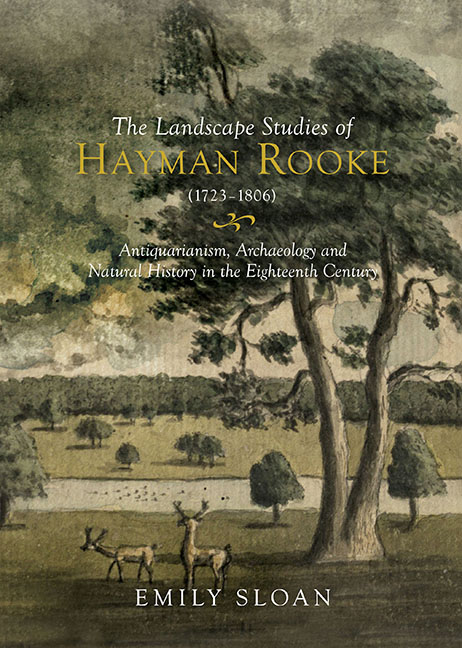 The Landscape Studies of Hayman Rooke (1723–1806)
The Landscape Studies of Hayman Rooke (1723–1806) Book contents
- Frontmatter
- Contents
- List of Illustrations
- Acknowledgements
- List of Abbreviations
- Introduction
- chapter 1 Rooke and His World
- chapter 2 Rooke and the Natural World
- chapter 3 Rooke and Ancient Britain
- chapter 4 Rooke and Roman Britain
- Conclusion Rooke and his Landscape Studies
- Appendix 1 List of Rooke's Publications
- Appendix 2 Reconstruction of Rooke's Diary
- Notes to the Text
- Bibliography
- Index
chapter 2 - Rooke and the Natural World
Published online by Cambridge University Press: 31 August 2019
- Frontmatter
- Contents
- List of Illustrations
- Acknowledgements
- List of Abbreviations
- Introduction
- chapter 1 Rooke and His World
- chapter 2 Rooke and the Natural World
- chapter 3 Rooke and Ancient Britain
- chapter 4 Rooke and Roman Britain
- Conclusion Rooke and his Landscape Studies
- Appendix 1 List of Rooke's Publications
- Appendix 2 Reconstruction of Rooke's Diary
- Notes to the Text
- Bibliography
- Index
Summary
It was not unusual for an antiquary to maintain an interest in natural phenomena. Natural history fell within the remit of eighteenthcentury observational science, embracing the study of flora and fauna, environmental characteristics such as rocks and soil, and the air. Rooke's studies encompassed such diverse subjects as fungi, geology and volcanoes, as well as trees and meteorology. Such apparently diverse topics came together in eighteenth-century regional histories, and can be clearly seen in Plot's Natural History of Oxfordshire, published in 1705, for example. Plot stated that he would ‘consider, first, Natural Things, such as she produces in her ordinary Course; as Animals, Plants, and the universal Furniture of the World. Secondly, her extravagancies and defects, as in Monsters. And then lastly, as she is restrained, forced, fashioned, or determined, by Artificial Operations. All which, without Absurdity, may fall under the general Notation of a Natural History.’ Unusual atmospheric phenomena were described under the ‘Arts’ section of the book, ‘Since … the Celestial Bodies are so remote, that little can be known of them without the help of Art’, but storms and lightning strikes were included in the first chapter, ‘Of the ‘Heavens and Air’. Subsequent chapters addressed different rock types and fossils, both of which were considered by Rooke, although there is less extant material on Rooke's interests in these areas. Prodigiously large oaks found mention in Plot's work, as in Rooke's pamphlets, and the final chapter of Plot's work addressed antiquities, ‘such as ancient Money, Ways, Barrows, Pavements, Urns, ancient Monuments of Stone, Fortifications, & c. whether of the ancient Britans, Romans, Saxons, Danes, Normans’.
Rooke's own interest in antiquarian, natural history and meteorological investigation was therefore not incongruous within the climate of the time, although Rooke followed his own path without slavishly copying the route of published examples. Rooke's accounts diverged from the outline of Plot's natural history in the absence of material regarding ‘Birds, Insects, Fishes, Reptils, and Four-footed Beasts’ or on ‘Men and Women’. Whilst there is a sheet in Rooke's sketches of a study of an unidentified caterpillar, it may be that this kind of study became too specialised to warrant inclusion in a county history.
- Type
- Chapter
- Information
- The Landscape Studies of Hayman Rooke (1723–1806)Antiquarianism, Archaeology and Natural History in the Eighteenth Century, pp. 45 - 84Publisher: Boydell & BrewerPrint publication year: 2019


